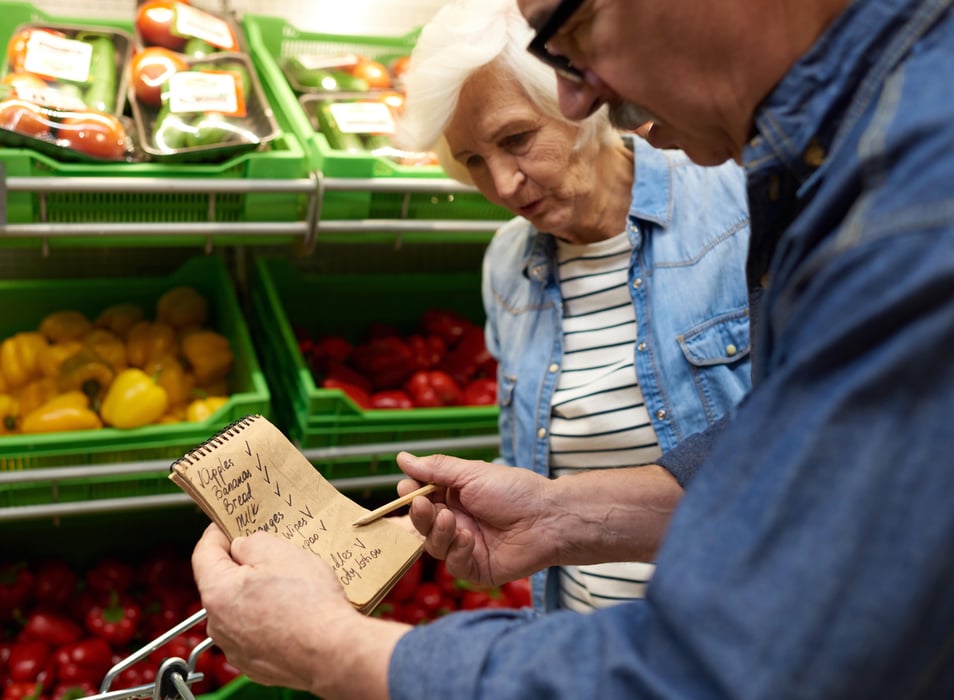Soaring Food Prices Are Tough on Older Americans, Poll Finds

TUESDAY, Sept. 27, 2022 (HealthDay News) -- While many older Americans are experiencing sticker shock when they shop for food, lower-income and less-healthy adults are hurting the most, a new poll reveals.
Three-quarters of respondents in the latest University of Michigan National Poll on Healthy Aging said the price of groceries has affected them somewhat or a lot. About a third said their diet is less healthy because of it.
More than one-third of the 50- to 80-year-olds surveyed said rising food costs have had a substantial impact on them. That included 46% of those who said their physical health was fair or poor, and 58% of those who described their mental health that way. About 48% of respondents with a high school education or less said prices were having a substantial impact on them, as did 56% of those with household incomes under $30,000.
"For our most vulnerable older adults, the huge increase we've seen in food costs could make a bad situation worse," said poll director Dr. Preeti Malani, a physician at Michigan Medicine.
"As the White House convenes its Conference on Hunger, Nutrition and Health this week, these new findings suggest a need for better support of the food needs of adults over 50," she said in a poll news release.
A sizeable group of older adults reported buying less healthy foods because of the prices. That was true for about 36% of 50- to 64-year-olds and 24% of those between 65 and 80.
Between 40% and 54% of those with less education, income or poorer health said their diets had become less healthy as prices have risen.
The poll also asked questions about food insecurity. Over the past year, 4% of older adults said they often worried that their food would run out before they had money to buy more; 15% said this had sometimes been true. Just under 4% said this had often happened to them, and 12% said it sometimes happened in the last year.
People who experienced food insecurity in the last year were three times as likely to report having an unhealthy diet because of food prices, 66% compared to 22%.
Between July 2021 and July of this year, grocery costs rose 13%, according to the U.S. Department of Agriculture. They are expected to increase another 10% in 2023.
Yet a new report from the AARP Policy Institute found that a majority of adults over 50 who qualified for U.S. federal food assistance through the SNAP program in 2018 were not enrolled.
The poll also asked participants about their eating habits and weight.
In all, a third of 50- to 64-year-olds and 44% of those over 65 said they had a well-balanced diet. Percentages were lower among adults who reported having fair or poor mental or physical health at 16% and 23%, respectively.
About 38% of older adults said they don't eat enough fruits and vegetables; 29% said they eat too many sweets; and 19% said they fail to get enough vitamins and minerals. Those percentages rose with additional risk factors, such as poor or fair health and lower education and income.
Concerning weight, a majority (68%) said they're overweight or slightly overweight. That included 47% of those in fair or poor physical health and 37% of those with fair or poor mental health or incomes under $30,000. About 13% of those with incomes under $30,000 said they were underweight.
The poll was conducted by phone and online in July among a representative sample of 2,163 adults between 50 and 80 years of age.
The poll, based at Michigan's Institute for Healthcare Policy and Innovation, was supported by Michigan Medicine and AARP.
More information
The U.S. Department of Agriculture has more on food security.
SOURCE: University of Michigan, news release, Sept. 26, 2022
Related Posts
First Shots Given in Trial of Moderna mRNA-Based HIV Vaccine
TUESDAY, Feb. 1, 2022 (HealthDay News) -- Vaccinations have been given to the...
Restrictive, Liberal Fluid Strategies Yield Similar Outcomes for Sepsis-Induced Hypotension
WEDNESDAY, Jan. 25, 2023 (HealthDay News) -- A restrictive fluid strategy does...
Sex Differences Seen in COVID-19 Sequelae, Long COVID
WEDNESDAY, June 22, 2022 (HealthDay News) -- There are sex-related differences...
Saltarse comidas podría quitarle años de vida
LUNES, 28 de noviembre de 2022 (HealthDay News) -- El ayuno intermitente...
